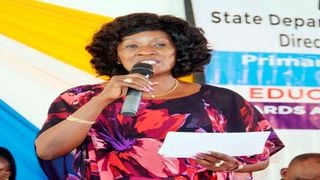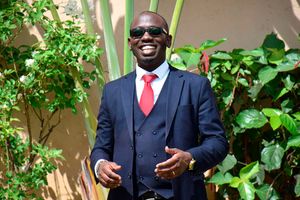
Teachers Service Commission boss Nancy Macharia during a past function at Shimo La Tewa High School in Mombasa.
|News
Premium
MPs want TSC split, new body set up to steer training
What you need to know:
- Among the powers MPs want to be withdrawn from the commission are those to register and train teachers.
- Teachers have lately not been happy with the way the Teachers Service Commission treats them.
The Teachers Service Commission (TSC) may lose some of the powers it exercises on tutors as MPs seek to stop the agency from being both an employer and a regulator.
The parliamentary committee on education plans to meet TSC chief executive Nancy Macharia, chairman Jamleck Muturi and the eight newly recruited commissioners to discuss the way forward.
Among the powers MPs want to be withdrawn from the commission are those to register and train teachers and review of the standards and training of persons entering the teaching service. The MPs propose that a separate professional body should be established to register and develop career development programmes and standards.
Committee chairperson Florence Mutua said her team will retreat to relook at the TSC Act of 2012, which allows the commission to perform the duties of both a regulator and an employer.
“We need to meet the TSC CEO, chairman and commissioners to discuss how we can tighten, enhance and separate the commission’s powers,” Ms Mutua said.
Among the proposed changes is for TSC to lose powers to register teachers and renew their licences.
A new agency will then be charged with developing a code of conduct and disciplining errant teachers. But MPs have not yet proposed the name of the proposed agency that will take over powers of the TSC if the changes to the law are passed by Parliament and assented to by the President.
Lawmakers have also not decided whether TSC will retain it’s current name or change to a different organisation. During his reign at Knut, former Knut secretary general Wilson Sossion pushed for a split of TSC to separate its role as a regulator and employer.
Regulator and employer
The Busia Woman rep added there have been issues being raised by teachers over the conduct of TSC and how it treats them.
Last week, the National Assembly Speaker Justin Muturi asked the Education committee to move with speed and address a petition tabled before Parliament by teachers who are members of the Kenya Union of Post Primary Education Teachers (Kuppet), who are opposed to the Teacher Professional Development (TPD) scheme.
Teachers have also been pushing for Parliament to amend the TSC Act 2012 and strip the commission some of its powers and separate its roles from being a regulator and an employer.
Ms Martha Omollo, the leader of Teachers Pressure Group, which is opposing the TSC and called for resignation of union leaders, was yesterday summoned to TSC headquarters, a move that has raised concern among teachers.
The MPs propose that a separate professional body should be established to register and develop career development programmes and standards.
In medicine and law, the professions are regulated by separate bodies other than the employer.
In other countries such as Zambia, teachers are regulated by a council, which is a separate body from the teachers’ service commission.
New entry grades
The TSC constitution (Article 247) gives the commission powers to register trained teachers, recruit and employ those registered, assign teachers employed by the commission for service in any public school, promote and transfer teachers, exercise disciplinary control and terminate the employment of rogue teachers.
The commission also exercises the powers to review the standards of education and training of persons entering the teaching service, review demand for and supply of teachers and advise national government on matters relating to the teaching profession.
Being an independent body, the Ministry of Education cannot step in to review standards of education and training of people joining the teaching career.
An attempt by former Education CS Amina Mohamed to introduce new entry grades for teachers in marginalised counties to get into college with C- for diploma and D+ for certificate courses was opposed by TSC.
The grades had been lowered for students from the marginalised counties and backdated to candidates who sat the KCSE from 2006.
The counties were Turkana, Samburu, Wajir, Marsabit, Isiolo,Manderra,Garissa, Lamu,Baringo, Narok, Kajiado, Kwale,Kilifi, Taita Taveta, Tana River and West Pokot. The lowering of grades was done in accordance with legal provisions and following the Kenya National Qualifications Framework Regulations, 2018.
However, TSC threatened not to employ the teachers who would be trained on lower grades.
The clash between the TSC and the ministry led to 3,265 students being kicked out of teachers’ colleges and ministry had to compensate them.





